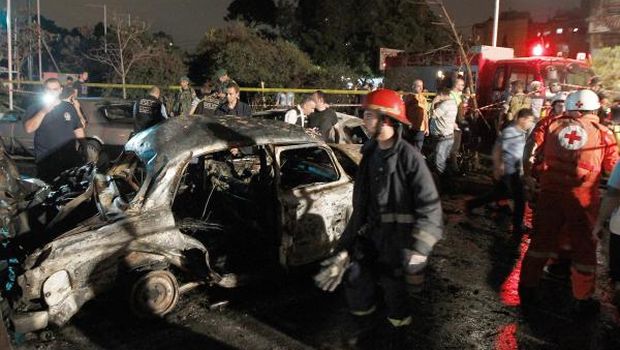The actions of the terrorists who have launched a new wave of attacks on Lebanon via bombings in the Dahieh suburbs south of Beirut have gone beyond being simply a response to Hezbollah for its intervention in the fighting in Syria and a bid to deter its leaders.
The success achieved at lightning speed by the Islamic State of Iraq and Syria (ISIS) in Iraq has raised the militant group’s spirits and encouraged it to spread to new Arab regions, with different tactics and even wider objectives.
The terrorists’ desire is to ignite Sunni-Shi’ite unrest in Lebanon, sparing no one, and at any cost. Reports have been confirmed about a plan to bomb a large hospital full of patients in the Dahieh, which if implemented would cause families of victims to react in a ruthless sectarian manner. Senior figures, political and military, are also the targets of the terrorists, whose aim is to fuel further anger and unrest among the population.
However, intentions to cause this kind of sedition through assassinations and attacks on populated areas may backfire on ISIS and its affiliates this time—Lebanon is not Western Iraq, and Beirut is not Mosul.
The terrorists partially succeeded, in the last wave of violence that arrived in Lebanon by land from the Syrian border, championed by Syrians and Lebanese, to persuade some that their target was Hezbollah.
However, the new wave of terrorists of various nationalities who arrived at Beirut airport with the aim of attacking hotels in the city, hitherto immune to such threats, shows that Lebanon as a whole is now the target, as it is its economy that is being hit through the targeting of the tourism industry. Every citizen must be vigilant to the point of sacrificing themselves in order to stop these criminals.
The terrorists’ hysteria and their movement—which seems to have no particular aim or direction except to terrorize people—is spreading a state of confusion in Beirut and igniting enormous hatred for the murderers.
How can any Lebanese citizen believe that Hezbollah is the only target when reports mention that a lorry laden with three tons of explosives is roaming about undetected, while no one knows where it could explode, and cars, equally equipped to kill, are also cruising among the people, biding their time to find their victims?
Everyone is affected when the tourist season is hit for the fourth year running, and Beirut hotels become hideouts for terrorists, their rooms scenes of criminal investigations and their entrances an arena of military operations that are broadcast on satellite channels.
The terrorists’ hysteria also increased when it was discovered that their organizations were being infiltrated to their very core by intelligence; that their members arrived in Lebanon only to find that their names and photos, their list of targets and the places they intended to visit, arrived before them.
Lebanese intelligence with US and other Western help, gives the impression that they can find a needle in a haystack. And indeed, four preemptive security operations within one week is something to be reckoned with. Members of a terrorist cell in northern Lebanon planning to assassinate a senior officer were arrested. A planned bombing in Dahr El-Baydar was uncovered before the driver reached his target. The suicide bomber of El-Tayyouneh in the Dahieh was arrested before he reached his objective, and part of the plans of the terrorists targeting hotels were thwarted, and the search is now on for the rest of them.
This does not mean that Lebanon is saved, but it does indicate that the earth-shattering victory by “ISIS and its affiliates” in Iraq has given it self-confidence, which could in fact be fatal. Not only because it has rushed its acts of destruction and its bid to control areas where it has no actual support among the population, but also because it continues to antagonize the public and at the same time give itself a terrible image—one that implies that those arrested are not human, but vampires from old legends.
The real names of the suicide bombers are forgotten, but they themselves call to mind the names Lilith, Omachto and Gallo, mentioned in the legends of Mesopotamia, and their evil souls that threaten all forms of life.
The terrorist at the “Napoleon Hotel” said during his interrogation that he was just a delivery man. The young Frenchman, who originates from the Comoros Islands, had no idea what he was going to blow up or how. He said he landed in Beirut awaiting a call to go to the destination he was instructed to go to, as though he were a delivery man in a fast-food restaurant.
It seems that the position of the suicide bomber is that of being a cog in a huge machine. He gives his soul to his employers in order to ignite fires wherever they tell him to. The big and so far elusive question is what are the Lebanese parts in this evil machine—which so far seem insignificant.
Those few people who carried out the terrorist operations to date were trained in Syria, and their role was secondary. The new arrivals are foreign suicide bombers—and foreign to the Lebanese environment.
The question which no one has answered is: who are the Lebanese who are receiving, supporting and coordinating this satanic band that has suddenly arrived in Beirut and settled in the heart of the capital? How are the terrorists moving around in the bustling heart of the city without having a solid base in the city from which to carry out their criminal acts?
For a terrorist to be only the “delivery man” may be true, but it is hard to believe that Al-Qaeda has not opened a branch in Lebanon—even a small modest one— in order to arrange for such “orders” to be delivered. This situation needs a high level of security alertness, as well as comprehensive and uncompromising political support.
